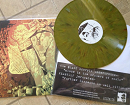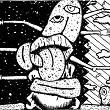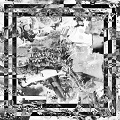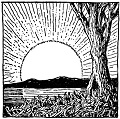 ‘Duets For Abdelrazik’ is a set of songs dedicated to political prisoner Abousfian Abdelrazik of Canada by way of Sudan. Coordinated by the pianist and the disc’s constant collaborator Stefan Christoff, these six duets emerge idiomatically like jazz, but resemble more the “neoclassical” strain of post-rock music. Christoff is joined by instrumentalists like Sam Shalabi (Shalabi Effect, Land of Kush), Rebecca Foon (Esmerine, Silver Mt. Zion), Matana Roberts (Sticks and Stones) – folks repping the melancholic, avuncular adult-contemporary strains from the Montreal collectivities such as Alien 8, Madrona (Foon’s label), the scenes at La Sala Rossa and Casa del Popolo, and the session heads hanging out at Hotel2Tango. “Instrumentalist” is a key distinction of these technician-types: their sound is neo-classical in the sense of never abandoned, that romantic sentiment, but coming from the relative outside – think Rachel’s or Town & Country – rather than the “inside man” antics relating more to postmodernism, as in Michael Nyman or Laurie Anderson. The “duets” of the title in this sense refer first to the instruments themselves, not in some virtuoso contest, but appearing in the earthy hues of folk music. The instruments are fostered to represent themselves (often non- and extra-western selves), in a minimalist recursion, and the players themselves disappear back to type on the sleeve, abstracted as the title of each track. It may seem glib, but the best way to describe each is simply: duet of piano and saxophone, duet of piano and violin, duet of piano and buzuq, and so forth. For example, though Peter Burton’s contribution on contrabass severely enhances Christoff’s fine-dining ballad, the germ of this track is really the timbrel juxtaposition rather than some profound revision of composition. Similarly, the 12 minute collaboration with Shalabi’s oud sees the more traditional structures of the instrument’s design take lead while the piano responds in a craftsperson’s aphorism. The idiom is stable, mature; this musicianship is “pedestrian” not in a critical but in a political sense, proud of its sure-footedness and presence, similar to the reclaimed ether when we “take back the night”. Stamped CDrs come in heavy, screened chipboard sleeves with an insert.
‘Duets For Abdelrazik’ is a set of songs dedicated to political prisoner Abousfian Abdelrazik of Canada by way of Sudan. Coordinated by the pianist and the disc’s constant collaborator Stefan Christoff, these six duets emerge idiomatically like jazz, but resemble more the “neoclassical” strain of post-rock music. Christoff is joined by instrumentalists like Sam Shalabi (Shalabi Effect, Land of Kush), Rebecca Foon (Esmerine, Silver Mt. Zion), Matana Roberts (Sticks and Stones) – folks repping the melancholic, avuncular adult-contemporary strains from the Montreal collectivities such as Alien 8, Madrona (Foon’s label), the scenes at La Sala Rossa and Casa del Popolo, and the session heads hanging out at Hotel2Tango. “Instrumentalist” is a key distinction of these technician-types: their sound is neo-classical in the sense of never abandoned, that romantic sentiment, but coming from the relative outside – think Rachel’s or Town & Country – rather than the “inside man” antics relating more to postmodernism, as in Michael Nyman or Laurie Anderson. The “duets” of the title in this sense refer first to the instruments themselves, not in some virtuoso contest, but appearing in the earthy hues of folk music. The instruments are fostered to represent themselves (often non- and extra-western selves), in a minimalist recursion, and the players themselves disappear back to type on the sleeve, abstracted as the title of each track. It may seem glib, but the best way to describe each is simply: duet of piano and saxophone, duet of piano and violin, duet of piano and buzuq, and so forth. For example, though Peter Burton’s contribution on contrabass severely enhances Christoff’s fine-dining ballad, the germ of this track is really the timbrel juxtaposition rather than some profound revision of composition. Similarly, the 12 minute collaboration with Shalabi’s oud sees the more traditional structures of the instrument’s design take lead while the piano responds in a craftsperson’s aphorism. The idiom is stable, mature; this musicianship is “pedestrian” not in a critical but in a political sense, proud of its sure-footedness and presence, similar to the reclaimed ether when we “take back the night”. Stamped CDrs come in heavy, screened chipboard sleeves with an insert.
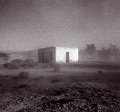 Speaking of what came to be known as “post-rock”: ‘Allelujah! Don’t Bend! Ascend!’ proves it’s politics as usual for Godspeed You! Black Emperor, still proudly made in Montreal, like Christoff’s duets or the sonic “casserole” protests sampled at the end of opening track “Mladic”. Ten years since the last release (and three since they broke hiatus to play live), GY!BE are as well-prepared as possible to resurface, with their regular artistic effacement and their cautious, caring, and always sporadic release schedule back in the 20th century. Still, a decade will necessarily tack-on mythologies and impossible expectations for anyone, particularly the first band you ever liked with a cellist and projectionist. How did they manage to land on their feet? Well first, it’s not like they ever “retired”: the essential, communal nature of the ensemble, their manufacture at Constellation records, and the scene at large has meant the band retains limber authority in addition to the authorship of their legacy. In sum, they have the chops and the rights to tell us what they mean. Second, and more important, is they do so in the plainest terms: the structures of ‘Allelujah!’ are conventions in the strictest sense. It is conventional in the sense of tradition, in the face of a liquid modernism. Familiar to the GY!BE formula, the elements are all there: caterwauling strings, minor chord phrasings, anthemic guitars, sinister bits of found dialogue, and of course, that Fibbonacian swell and break of triumphant tragedy and beauty. The filmic screens are there – the band having in many ways defined how we imagine the new mediated soundtrack – with the evasive prose of the soundbites and titles, commenting with even consistency the radical platform which others would have furnished and forgave by now. The dread and faith of the activist, the integration of zine-writing, the “personal” politics in street art – impressionistic as they may be, they willingly spill-over the edges of the page, disc, canvas – the “album”, most definitely. The songs stand alone, observing only the most tentative balance based in contrasting dynamics: the accumulating overtures of “Their Helicopters’ Sing” bleeds into the jubilant minimalism of “We Drift Like Worried Fire” to the droning, psychedelic dirge of “Strung Like Lights At Thee Printemps Erable”. This is the idiom which defines post-rock (and, to be sure, it is the first quality lost in its commercialization as a genre). It is the founding statement, and the reason GY!BE hasn’t lost their footing: they ceded no ground in the first place.
Speaking of what came to be known as “post-rock”: ‘Allelujah! Don’t Bend! Ascend!’ proves it’s politics as usual for Godspeed You! Black Emperor, still proudly made in Montreal, like Christoff’s duets or the sonic “casserole” protests sampled at the end of opening track “Mladic”. Ten years since the last release (and three since they broke hiatus to play live), GY!BE are as well-prepared as possible to resurface, with their regular artistic effacement and their cautious, caring, and always sporadic release schedule back in the 20th century. Still, a decade will necessarily tack-on mythologies and impossible expectations for anyone, particularly the first band you ever liked with a cellist and projectionist. How did they manage to land on their feet? Well first, it’s not like they ever “retired”: the essential, communal nature of the ensemble, their manufacture at Constellation records, and the scene at large has meant the band retains limber authority in addition to the authorship of their legacy. In sum, they have the chops and the rights to tell us what they mean. Second, and more important, is they do so in the plainest terms: the structures of ‘Allelujah!’ are conventions in the strictest sense. It is conventional in the sense of tradition, in the face of a liquid modernism. Familiar to the GY!BE formula, the elements are all there: caterwauling strings, minor chord phrasings, anthemic guitars, sinister bits of found dialogue, and of course, that Fibbonacian swell and break of triumphant tragedy and beauty. The filmic screens are there – the band having in many ways defined how we imagine the new mediated soundtrack – with the evasive prose of the soundbites and titles, commenting with even consistency the radical platform which others would have furnished and forgave by now. The dread and faith of the activist, the integration of zine-writing, the “personal” politics in street art – impressionistic as they may be, they willingly spill-over the edges of the page, disc, canvas – the “album”, most definitely. The songs stand alone, observing only the most tentative balance based in contrasting dynamics: the accumulating overtures of “Their Helicopters’ Sing” bleeds into the jubilant minimalism of “We Drift Like Worried Fire” to the droning, psychedelic dirge of “Strung Like Lights At Thee Printemps Erable”. This is the idiom which defines post-rock (and, to be sure, it is the first quality lost in its commercialization as a genre). It is the founding statement, and the reason GY!BE hasn’t lost their footing: they ceded no ground in the first place.
Howl! Arts Collective CDr
$15
HERE
Constellation LP/CD
$18/$12
HERE
 ‘The Pale Light’ marks just the sixth release from Elm Recordings, the new tape label run by Kryssi (Colorguard) out of New Haven, CT. Elm City resident Jon Eriksen keeps his discriminating appearance short and sweet with two long-form tracks split between the short-form sides of a C15. Fitting, the exiled Swede has run a tight ship, poring over the most recent incarnation of his sound with semi-regular performances and even scanter releases (his LP will be an embarrassment of riches when it drops later this year.) While familiar to harsh noise of a technical, high-definition sort – his earlier CDrs have a strong resemblance to the most surgical cuts of John Wiese – Eriksen’s work of the last few years has migrated toward maximal melodic ragas verging on Tim Hecker and Fennesz. Side A, “The pale light, white and muted” (the titles will thrill the loftiest of impressionists), is a turgid blast of metallic squawk and sing refracted and illuminating a coarsely carved background. On the reverse, “In the dusk, hiding” exhibits more a singular focus, familiar to the processed guitars of Jef Ledesma and Alex Cobb. Now emitting as a source of light, the shard of a cursor jags wildly in the upper registers, vibrating white hot at its edges and distorting the surrounding sound field. Demonstrating a similar interest in the biomechanics of Menche, and without the totalizing experience of overt Noise worshippers, Eriksen’s rescaling of harsh patches within the rhythmic grid evokes the new generation of electronica on the Invada label, where the maturing technology of noise is returned to a rediscovered context of musicality. My favorite from the artist so far. Paper inserts and pasted labels, in a hand-numbered edition of 110 tapes. Very recommended.
‘The Pale Light’ marks just the sixth release from Elm Recordings, the new tape label run by Kryssi (Colorguard) out of New Haven, CT. Elm City resident Jon Eriksen keeps his discriminating appearance short and sweet with two long-form tracks split between the short-form sides of a C15. Fitting, the exiled Swede has run a tight ship, poring over the most recent incarnation of his sound with semi-regular performances and even scanter releases (his LP will be an embarrassment of riches when it drops later this year.) While familiar to harsh noise of a technical, high-definition sort – his earlier CDrs have a strong resemblance to the most surgical cuts of John Wiese – Eriksen’s work of the last few years has migrated toward maximal melodic ragas verging on Tim Hecker and Fennesz. Side A, “The pale light, white and muted” (the titles will thrill the loftiest of impressionists), is a turgid blast of metallic squawk and sing refracted and illuminating a coarsely carved background. On the reverse, “In the dusk, hiding” exhibits more a singular focus, familiar to the processed guitars of Jef Ledesma and Alex Cobb. Now emitting as a source of light, the shard of a cursor jags wildly in the upper registers, vibrating white hot at its edges and distorting the surrounding sound field. Demonstrating a similar interest in the biomechanics of Menche, and without the totalizing experience of overt Noise worshippers, Eriksen’s rescaling of harsh patches within the rhythmic grid evokes the new generation of electronica on the Invada label, where the maturing technology of noise is returned to a rediscovered context of musicality. My favorite from the artist so far. Paper inserts and pasted labels, in a hand-numbered edition of 110 tapes. Very recommended.


